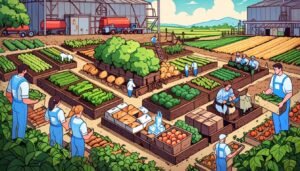**United States**: At the Natural Products Expo West, experts revealed how food companies facing geopolitical disruptions can use climate resilience strategies like supply chain visibility, collaboration, and AI integration to strengthen business continuity and build consumer trust amid global uncertainties.
Food companies facing geopolitical challenges to their supply chains and market conditions may find that strategies developed for climate resilience are also effective in navigating political and economic uncertainties, industry experts suggest. At the Natural Products Expo West held last month, a panel of veteran climate activists and industry leaders shared insights on how the same foundational elements of sustainability can support businesses during turbulent times.
Julia Collins, founder and CEO of the decarbonisation platform Planet FWD, emphasised supply chain resilience and traceability as the cornerstone of any robust sustainability programme. She explained that having a comprehensive map of supplier relationships—from the farm level through to finished products—is essential not only for environmental objectives but also for mitigating risks linked to geopolitical tensions, such as trade wars and labour immigration changes. “When you actually have visibility into where your supply is coming from,” including second- and third-tier suppliers, “you can start to remove sole supplier risk,” whether from climate change or shifts in political landscapes, Collins said.
Building strong, transparent relationships with upstream suppliers was also highlighted as vital. Collins described this as “a conversation” about renewable energy, regenerative agriculture, and packaging, rather than a demand, stating: “That is also the kind of conversation that you need to be having to survive some of the shocks that we are seeing around the tariffs right now.”
Collaborative approaches between competitors and partners were presented as necessary for resilience, with Collins advocating for “radical collaboration,” a level of cooperation that requires making trade-offs and working closely—even uncomfortably—with competitors to find solutions. Kyle Koehler, co-founder and CEO of Wildway, echoed this viewpoint, recommending the Just Transition Framework to guide such efforts. Originating in the 1980s, the framework aims to protect workers’ rights while fostering a shift towards regenerative economies that emphasise wealth diversification across business and supply chains. Koehler remarked, “Just like I believe that regenerative farming practices and ingredients and growing makes for a more resilient crop, regenerative business makes for a more resilient business during times of great change as well.”
Andrew Burke, CEO and President of Lotus Foods, advised companies to adopt objectivity when re-evaluating partnerships in response to supply chain challenges. He noted that longstanding partners may no longer fit a company’s evolving needs in the face of market shocks and suggested transparent, empathetic communications when partnerships end, coupled with openness about future opportunities: “You always want to make sure that you leave a partnership with a thought of how you would enter into it.”
To foster consumer trust and market shifts towards sustainable products, Collins recommended combining data with storytelling. She likened data-driven narratives to a peanut butter sandwich—substantial but dry—and stories alone to a jelly sandwich—sweet but lacking substance. When combined, they create a compelling narrative, “something that is so much bigger than any individual part.”
Technological tools like artificial intelligence (AI) could aid companies in navigating uncertainty more effectively. Riana Lynn, CEO of AI supply chain software company Journey Foods, shared that since autumn of last year her firm has integrated geopolitical factors such as tariffs into predictive pricing models to help clients plan strategically. Lynn sees North America’s regional integration—spanning the United States, Canada, Central America, and Mexico—as a critical component of future supply chain strength, explaining, “It is important to help and serve and communicate that with our customers” through AI-driven demonstrations to build leverage and trust.
Koehler also stressed the importance of supporting local economies at a more immediate community level. He called on companies to explore tightening geographic boundaries for sourcing and manufacturing, creating jobs and stabilising supply chains by working with smaller partners in the local area, which in turn can stimulate broader economic benefits.
The insights shared at the Natural Products Expo West underline a convergence of sustainability and business continuity strategies. Supply chain visibility, collaborative relationships, thoughtful partner assessment, data-informed storytelling, advanced technology, and local economic support all appear to be integral elements for food companies to remain resilient amid both climate and geopolitical uncertainties.
Source: Noah Wire Services


